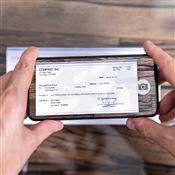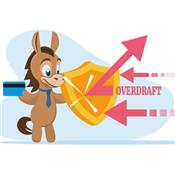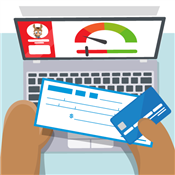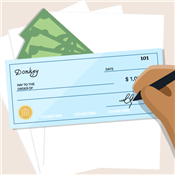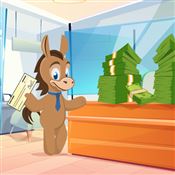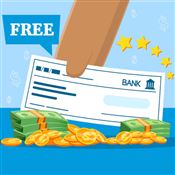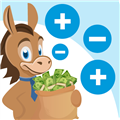When Good People Write Bad Checks
What happens when good people write bad checks? Find out how a bounced check could affect you.
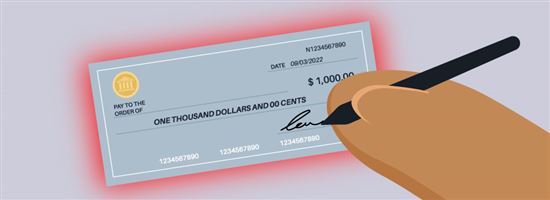 |
Maybe your paycheck didn't hit your account on time. Or a check you wrote a long time ago was only recently deposited.
Whatever the reason, there may be a time when your checking account dips lower than you expected. When you try to write a check with insufficient funds, your bank will bounce it. You've written a bad check.
This can cause all sorts of problems. You'll have to pay fees, and it could even affect your credit score if you keep writing bad checks.
Before the situation gets out of hand, you'll have plenty of chances to fix it. Find out what happens when you write a bad check. Plus, learn how to avoid a bounced check altogether.
What is a Bad Check?
A bad check is a payment drawn from an account with insufficient funds. Since there isn't enough money in the account, the checkwriter's bank will bounce the check.
Some people write bad checks knowing they don't have enough funds. That's fraud, and it can get the checkwriter into legal trouble.
More often than not, writing a bad check is just an honest mistake. Running low on funds could happen to anyone. But bad checks can cost you money and cause a host of problems if they become a regular occurrence.
What happens when good people write bad checks? Learn more about the penalties for bounced checks. Plus, find out how to protect yourself from a bad check.
How a Bad Check Affects You
 |
You just found out a check you wrote bounced. Now what? Find out what happens to you when you write a bad check.
Fees
Unfortunately, writing a check when you don't have enough funds can cost you even more money.
If your account goes in the negative as a result of a bad check, you'll have to pay the dreaded non-sufficient funds (NSF) fee.
According to the FDIC, the average NSF fee is around $30.[1] If you have overdraft protection, your bank may withdraw funds from a different account to cover the check. But, you'll still have to pay an overdraft fee and fix the negative balance on your account.
These fees stack up. If you've unknowingly written multiple bad checks, you'll get charged an NSF fee for each one. This can put you deeper in the red before you even catch the mistake.
Impact on Credit Score
Good news first: a single bounced check won't directly affect your credit score. The bad news is that a history of bounced checks can affect your credit score.
Bad checks can show up on your credit report when you use them to repay debt. This includes student loans, mortgages, and credit cards. Companies can report a bad check to credit agencies as a late payment.
Most companies won't report late payments right away. You'll usually have 30 days to correct the mistake before the late payment ends up on your credit report. If you don't address the issue or you repeatedly miss payments, expect your credit report to reflect that.
Late payments on your credit report can bring your credit score down. Even worse, late payments stay on your credit report for 7 years.
Bad Check Record
A history of bounced checks can stay with you for years. Here's how it can affect your relationship to banks and merchants:
Banks
Banks keep track of customers who repeatedly write bad checks. Repeat offenders are reported to ChexSystems, a reporting agency for banking activity. This signals to other banks and credit unions that the customer is high risk.
Negative marks will stay on your account for 5 years. During this time, it can be very difficult to open a new bank account. Most banks won't want to take on a risky customer.
Merchants
Similar consequences can happen when your check bounces at the cash register. Merchants can report bad checks to an agency called TeleCheck. TeleCheck analyzes your check when you use it to pay at a store.
If you have negative marks on your account, merchants will be able to see that. They could refuse to accept your check, and you'd have to use a different form of payment. Negative marks stay on your account for 7 years.
Legal Penalties
Don't worry—you won't be thrown in jail for accidentally writing a bad check once in a while.
But when a person knowingly writes a bad check and tries to pass it off as legit, that counts as fraud. This is a criminal offense. Each state has different laws surrounding bounced checks.
In some states, the difference between a misdemeanor and a felony charge depends on the value of the check. In California, for example, attempting to pass a bad check of more than $950 is a felony. Checks below that amount would just be a misdemeanor.
How to Avoid Writing Bad Checks
 |
It can happen to anyone, but it doesn't have to happen to you. Here's how to protect yourself from writing a bounced check.
Monitor Your Account
The best way to prevent a bad check is to keep tabs on your money. It's a good idea to frequently check your bank balance. This can also help you catch any fraudulent charges to your account.
Get familiar with how to balance a checkbook, even if you rarely use your checkbook. Knowing how to keep your accounts balanced is a fundamental part of money management.
Many banks let you set up alerts when your account balance drops below a certain amount. Take advantage of this so you won't be caught off guard if your funds run low for any reason.
Keep a Buffer
Whenever possible, keep more money in your checking account than you think you'll need for the month. Having extra funds in your account as a buffer could save you from a bounced check.
With a checking account buffer, you'll be less likely to put your account in the red. The right buffer amount depends on your personal spending habits. But keeping at least an extra $200 to $300 in your checking is a great start.
Find a New Budgeting Method
Low funds can happen for a number of reasons. If you find it difficult to keep track of where your money goes, it could be time to reconsider your budget.
There are many types of budgets, and it could take some trial and error to get it right. Check out these resources to help you keep track of your money:
Get Overdraft Protection
Many banks offer overdraft protection to prevent bad checks. Instead of letting your check bounce, the bank will draw money from a different account to cover the amount. Usually, the funds are taken from a linked savings account or a different checking account.
In this case, your check will clear. You'll need to pay an overdraft fee and correct your negative balance, but it's better than a bounced check.
Overdraft protection should be your last line of defense. You still have to pay for it, and your bank could still penalize you for overdrafting your account too often.
Use Other Payment Methods
If you don't have to pay using checks, consider using a different payment method.
Cash is useful because you can't spend more than you have on hand. It helps to be able to physically see and count how much money you have. Cash isn't always practical, though, especially if you have to pay large sums of money.
Debit cards are a great alternative to checks. They're also more convenient and secure than carrying a bunch of cash. If you don't opt into overdraft protection, your debit card will simply be declined if you have insufficient funds.
Bottom Line
If a bad check happens to you, it's not the end of the world. Most banks will waive your NSF fee if it's your first time. As long as you don't make a habit of it, you'll be just fine.
Monitoring your account and keeping a buffer can go a long way in preventing bounced checks. It might take a little getting used to at first. But it's less of a headache to prevent overdrafts than it is to do damage control after a bad check.
References
- ^ FDIC. Your Guide to Preventing and Managing Overdraft Fees. Accessed 05 Nov 2021.
Donna Tang is a content associate at CreditDonkey, a bank comparison and reviews website. Write to Donna Tang at donna.tang@creditdonkey.com. Follow us on Twitter and Facebook for our latest posts.
|
|
| ||||||
|
|
|
